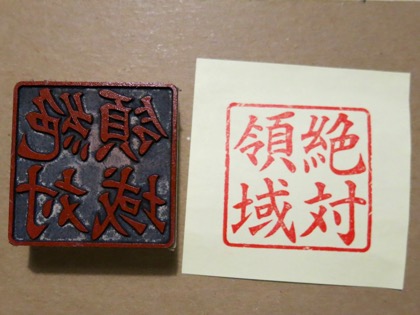Toys
Duck Soap
A little something we stumbled across while heading for the Terry Fator show at The Mirage.

Great show, by the way.
And if you want some really good Italian food in Vegas, go to Nora’s.
Reasons to have an OpenBSD router at home, Amazon Wand Edition
Since the new Amazon Dash Wand is effectively free for Prime customers, and it gives you a home-automation controller, bar-code scanner, and a hand-held Alexa device that is not always listening, I ordered one.
When it arrived this morning, I followed the instructions, opened the Amazon app on my iPhone, and went through the setup process. Wifi Fail. Wifi Fail. Wifi Fail. “You should contact customer service”.
The first 20+-minute call went through a bunch of cookbook questions about who my Internet provider was, and how to change the channel on my router. I had a brief flashback to the Seventies, then realized their script assumed Comcast meant “all-in-one cable modem, router, and wireless access point”. I played along, knowing this would make no difference, and the call eventually ended in an RMA.
I was curious to see if it really was a wireless problem, so I logged into the OpenBSD router, checked the DHCP logs, and found an entry for a new Amazon MAC address. I fired up tcpdump and went through the setup again, and sure enough, the device got DHCP, connected to the Internet for DNS, connected to an Amazon server, and then started trying to talk to a public (non-Amazon) NTP server to set its date and time.
It failed every time. Annoyingly, it wasn’t even looking in DNS for its NTP server; the addresses were hardcoded in either the build or the config it had downloaded.
So, armed with the knowledge that the hardware was fine, I tried to get back through to customer service with this knowledge. An hour later, after two different people tried to debug phone app, wireless and bluetooth problems (including telling me to turn on GPS on my phone!), I finally got someone to twiddle the right bits so it could connect to servers that were up, and then cancel the RMA.
Now I have a Dash Wand. Ho, ho, ho.
Corpus Fun
I’m pretty sure “futanari” is not Dutch. Also “gmail”, “iphone”, “http”, “cialis”, and “jackalope”. “bewerkstelligen”, on the other hand, fits right in.
For my new random word generator, I’ve been supplementing and replacing the small language samples from Chris Pound’s site. The old ones do a pretty good job, but the new generator has built-in caching of the parsed source files, so it’s possible to use much larger samples, which gives a broader range of language-flavored words. 5,000 distinct words seems to be the perfect size for most languages.
Project Gutenberg has material in a few non-English languages, and it’s easy to grab an entire chapter of a book. Early Indo-European Online has some terrific samples, most of them easily extracted. But what looked like a gold mine was Deltacorpus: 107 different languages, all extracted with the same software and tagged for part-of-speech. And the range of languages is terrific: Korean, Yiddish, Serbian, Afrikaans, Frisian, Low Saxon, Swedish, Catalan, Haitian Creole, Irish, Kurdish, Nepali, Uzbek, Mongol, etc, each with around 900,000 terms. The PoS-tagging even made it easy to strip out things that were not native words, and generate a decent-sized random subset.
Then I tried them out in the generator, and started to see anomolies: “jpg” is not generally found in a natural language, getting a plausible Japanese name out of a Finnish data set is highly unlikely, etc. There were a number of oddballs like this, even in languages that I had to run through a romanizer, like Korean and Yiddish.
So I opened up the corpus files and started searching through them, and found a lot of things like this:
437 바로가기 PROPN
438 = PUNCT
439 http VERB
440 : PUNCT
441 / PUNCT
442 / PUNCT
443 www NOUN
444 . PUNCT
445 shoop NOUN
446 . PUNCT
447 co NOUN
448 . PUNCT
449 kr INTJ
450 / PUNCT
451 shop PROPN
452 / PUNCT
453 goods NOUN
454 / PUNCT
455 goods_list NOUN
456 . PUNCT
457 php NOUN
458 ? DET
459 category NOUN
460 = PUNCT
461 001014 NUM
1 우리의 ADP
2 예제에서 NOUN
3 content X
4 div에 NOUN
5 float VERB
6 : PUNCT
7 left VERB
8 ; PUNCT
Their corpus-extraction script was treating HTML as plain text, and the pages they chose to scan included gaming forums and technology review sites. Eventually I might knock together a script to decruft the original sources, but for now I’m just excluding the obvious ones and skimming through the output looking for words that don’t belong. This is generally pretty easy, because most of them are obvious in a sorted list:
binnentreedt
biologisch
biologische
bioscoop
bir
bis
bit
bitmap
bitset
blaas
blaasmuziek
blaast
Missing some of them isn’t a big problem, because the generator uses weighted-random selection for each token, and if a start token only appears once, it won’t be selected often, and there are few possible transitions. Still worth cleaning up, since they become more likely when you mix multiple language sources together.
Camelcide, Effectomy,and Memetical
How to tell that your new random-word generator works: feed it the text of the Jargon File and get back things that you could easily come up with real jargon definitions for…
Second impression
I decided to see how much detail I could get with the 20-degree v-bit. This was carved out of the end grain of a generic hardwood 1-inch square dowel.

Update: I shined a flashlight onto the seal to get a better look at it.

First impressions
This is a 2-inch square seal created in Illustrator with my script, imported to VCarve Desktop, and cut from a mounted linoleum block on my Nomad with a 20-degree v-bit. The hardest part about getting a good firm impression on paper is that my stamp pad is too darn small; I’ll have to buy an uninked pad at an office supply shop and load it up with the good pigment.

Also making a good impression is glamour model Meru Tsujimura, who cannot be found at office supply shops…
Dangerous words...
I walked into TAP Plastics today. The sign on the door said:
"Scrap sale, 75% off"
I gained 15 pounds of HDPE, for $8. I think I’ll go back tomorrow for a load of acrylic.
[Update: another $20, another 38 pounds of plastic (~21 HDPE, ~17 cast acrylic); I may go back again if I can find someone working there who knows what some of the mystery plastics in the scrap bin are…]
Acurite 5-in-1 Weather Station
So, someone got me one of these for my birthday, and I finally got around to building a stand for the outdoor sensor (basically an oversized tameshigiri stand made with pressure-treated lumber).
A promised feature was remote access to your data through an iOS/Android app, so I downloaded the app …and it didn’t work. Surprise! You have to:
- register your purchase online (and the form wouldn't let me hit Submit until I added demographic data...),
- plug the USB cable on the indoor sensor into a computer,
- download and run their PC/Mac app in the background,
- and leave your computer on at all times to report the data.
I have two words for that, and the first one starts with “F”.
So, delete the Mac app, delete the iPhone app, unplug the cable, and now I have a standalone weather station. Oh, well, at least it wasn’t an Internet of Things Thing that sat on my wireless and took orders from The Cloud.
Update: now that the sun is down, I can report that the backlighting on the screen is bright. I won’t be needing a nightlight downstairs any more.
